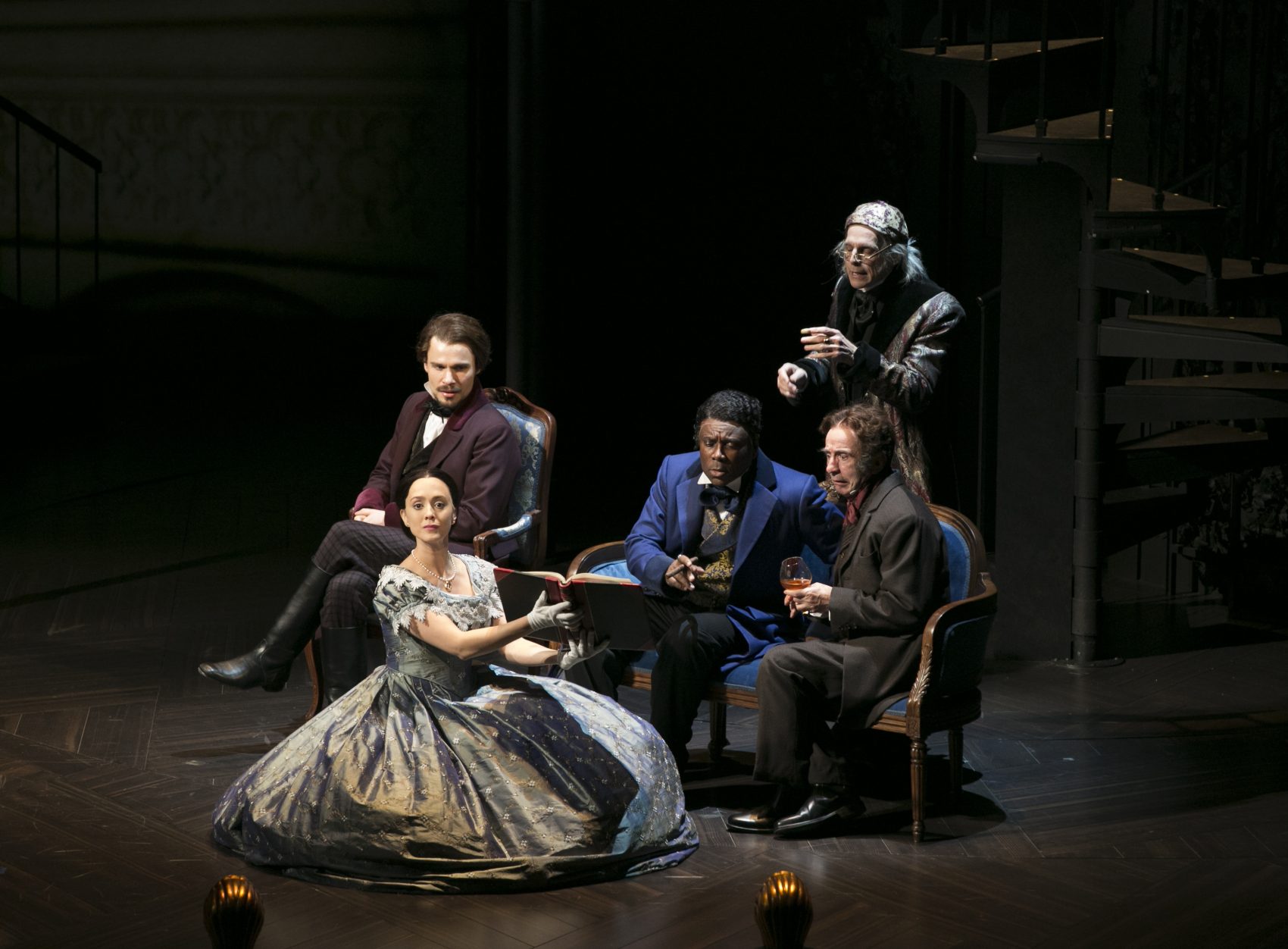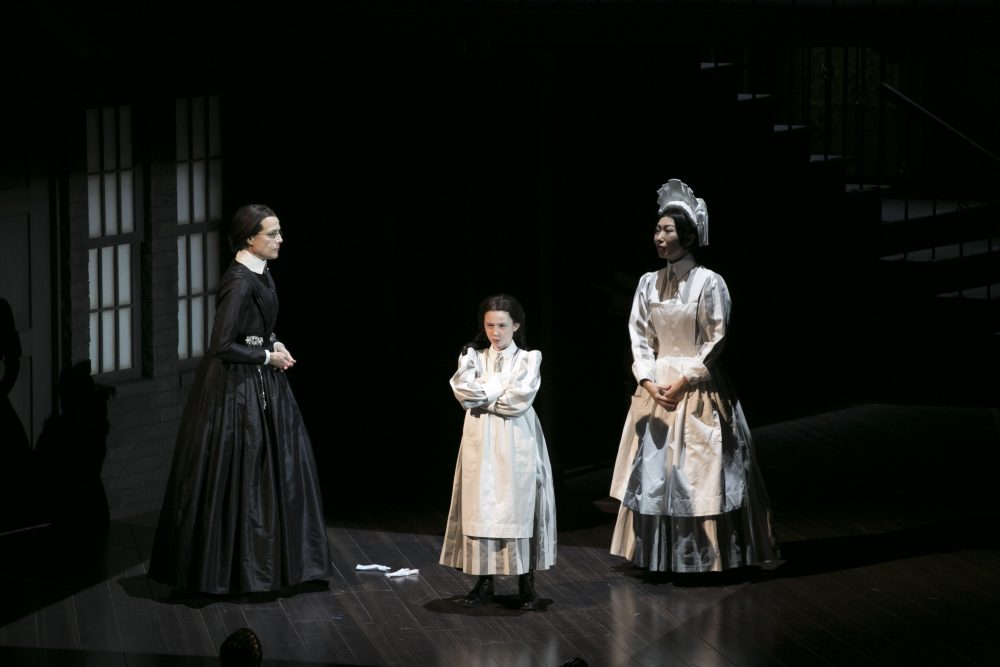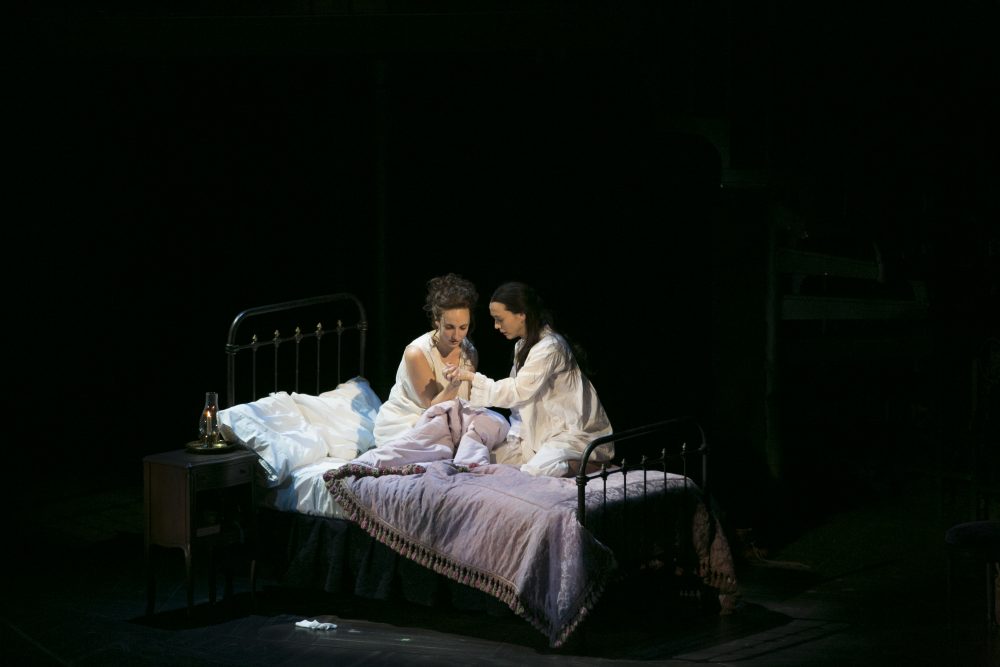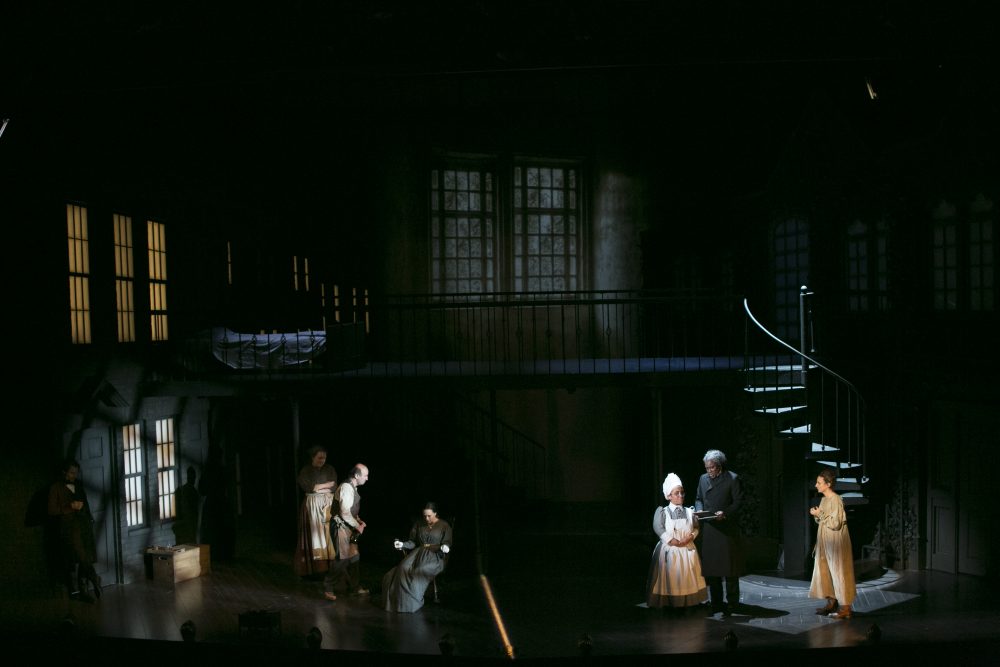Advertisement
The A.R.T. Layers Love And Betrayal In Victorian Thriller 'Fingersmith'

Take a neck brace with you: There are so many whiplash-inducing twists in “Fingersmith” (presented by American Repertory Theater at the Loeb Drama Center through Jan. 8) that you may need it. But I can’t tell you about any of these reversals. This Victorian thriller, rife with repressed love, double crosses and unreliable narration, is the sort of entertainment about which telling more than the premise amounts to a spoiler.
This much I can reveal: A.R.T. is countering the annual infusion of “A Christmas Carol,” with its overnight conversion from miserliness to mega-cheer, with a sootier, sultrier, less redeemable Dickensian England in which the art of the con has more layers than a Christmas trifle.
The play, adapted by Alexa Junge from the Man Booker Prize-nominated 2002 novel by Welsh writer Sarah Waters (which also became a BBC mini-series and is the basis for the Korean film “The Handmaiden”), unfolds in 19th-century London and environs. There, along with a number of unwanted infants, a plot is born that turns out to be part “Oliver Twist,” part Ingmar Bergman’s “Persona,” and part Radclyffe Hall. But the rough-hewn, atmospheric production, in which storytelling changes hands like a dexterously passed basketball, screams “Nicholas Nickleby.”

The theater piece opens on a low-rent den of thieves presided over by “baby farmer” Mrs. Sucksby, who takes in desperate pregnant women and then births and brokers their babies. Chief among her makeshift family is just such an erstwhile infant: Sue Trinder, the talented pickpocket of the title.
But Mrs. Sucksby and her criminal lot have a tonier associate called Gentleman, who comes calling with a business plan. This rake intends to court a gullible heiress imprisoned in a drafty old manse some miles from London, where, orphaned, she serves as unwilling secretary to an obsessive uncle said to be compiling a dictionary. Gentleman, who has business dealings with the uncle, means to install Sue as the lady’s maid, thus greasing his access to her. Once he marries the damsel, whose name is Maud Lilly, he means to take her money and dump her in a madhouse.
What Gentleman doesn’t count on, and the story is built on, is that Sue and Maud, both still teenagers, will develop an easy affection, then a deep erotic passion, for each other. But hot-under-the-bodice doings aside, nothing in “Fingersmith” points where you think it will. In the ruthless world of the play, burgeoning love can hardly be expected to trump scheduled, self-interested betrayal. And one woman’s "pearl" can quickly devolve into her worst enemy, to be assigned crude, contemporary, decidedly un-gemlike nomenclature.
Advertisement

Waters’ novel has been compared to those of Wilkie Collins, but that would be Collins with a few Music Hall tricks, as well a modern feminist perspective, up his sleeve. Given the novel’s numerous twists and turns of fortune (not to mention attempted thefts of fortune), the wonder is that Junge’s adaptation stays the course, both thematically and plot-wise, clocking in at a breathless two and a half hours. If the minor characters, as whom members of the ensemble are double and triple cast, lose some color, the principals remain surprising, sympathetic and vivid.
Cannily retained details — among them Maud’s never being divested of her white gloves, even when otherwise naked — add an eccentric, erotic charge to the thriller. There’s even a meta-theatrical component, with Tracee Chimo’s feral, feisty Sue and Christina Bennett Lind’s affectedly genteel Maud appealing or bristling or foully emoting directly to the audience. (Sometimes these asides are quite funny.) And both actresses are very good at narrating their own shifts between cunning and deep longing.
“Fingersmith,” the theater piece, debuted at the Oregon Shakespeare Festival in 2015, where it was helmed by artistic director and Harvard graduate Bill Rauch, who also directs the reworked version at A.R.T. (Rauch previously made the trek from Oregon to Cambridge at the helm of “All the Way,” which starred Bryan Cranston as Lyndon B. Johnson and moved from A.R.T. to Broadway, winning several Tony Awards.)
Christopher Acebo supplies the dark, richly detailed two-story set where Mrs. Sucksby and her consort occupy mean rooms with a fine upstairs view of the gallows while Maud and her nefarious uncle are holed up behind grand walls covered in desiccated ivy. The scenery also features a looming picture-book moon, which Jen Schriever’s shadowy lighting allows its sway. Deborah Dryden’s class-centric period costumes include a billowing “crinoline cage” for Maud that’s both literal and symbolic. And projections designer Shawn Sagady manages to make both hanging and near drowning appear brutal yet poetic.

Under Rauch’s inventive direction, the ensemble keeps events spiraling right along. Alas, sometimes their tongues move as quickly as the plot, and words, not to mention precise chains of event, are muddied. Mercifully, things slow down when Chimo’s Sue and Lind’s Maud let their hair — and their guard — down. And the play’s coda, suspended in a beginning, is both touching and pernicious.
Among the production’s nasty if charismatic menfolk, Josiah Bania is a proud scoundrel of a Gentleman, T. Ryder Smith almost magisterially kinky as Maud’s exacting uncle, Christopher Lilly. But the guys have no corner on villainy: As Mrs. Sucksby, who’ll hot-finger anything from your illusions to your kid to your bling, Obie-winner and Tony-nominee Kristine Nielsen steals the show. Her determinedly greedy, delicately frowsy, genuinely maternal thieves’-den mother is an unlikely mix of Fagin and Molly Bloom, who delivers the unsentimental message of the play: “Don’t none of us ask for the lives we get.” In the thieving, lying world of “Fingersmith,” few can hold on even to the ones they’ve been arbitrarily assigned.
